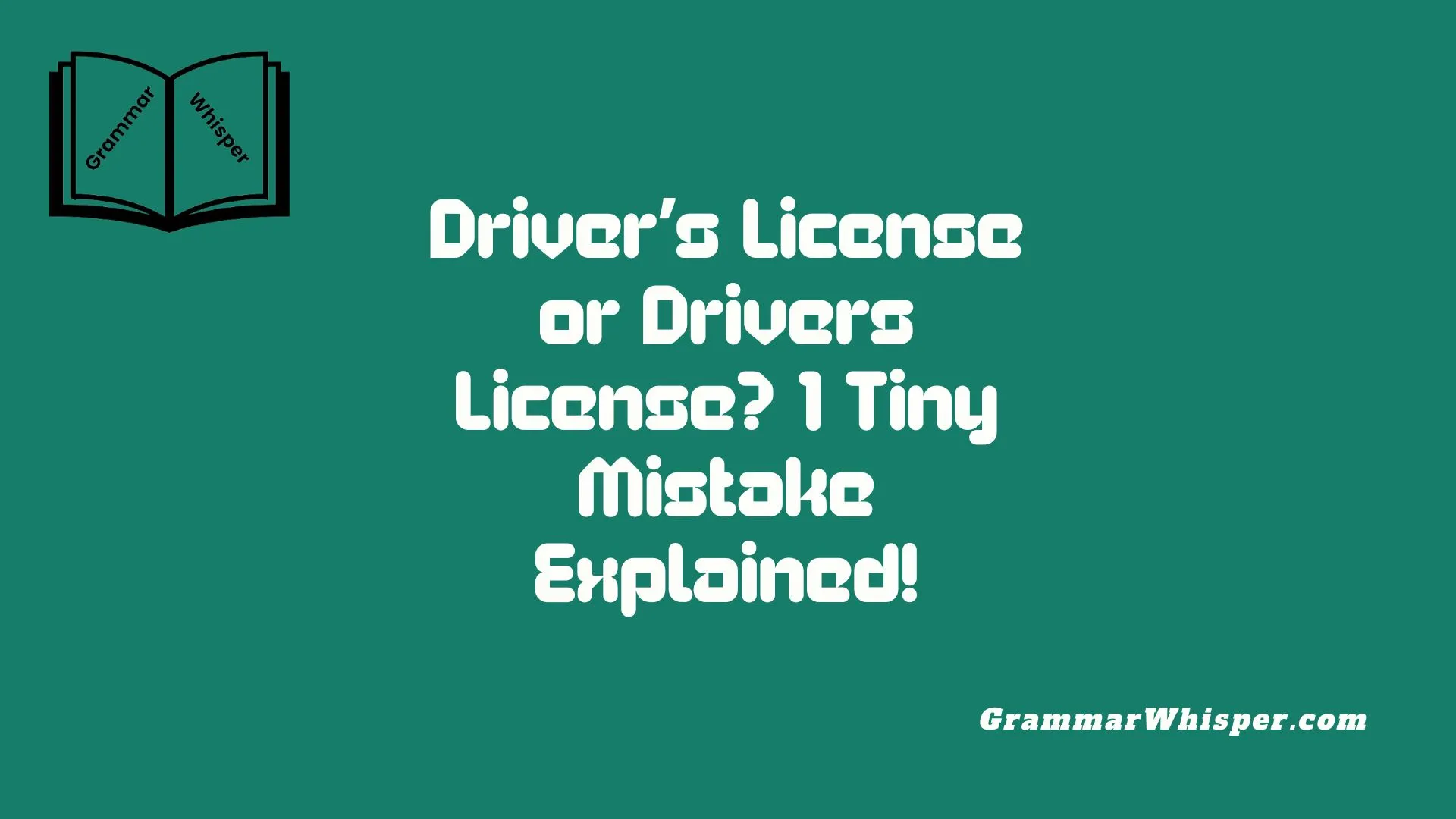Every time I pause while filling out a form or typing a document, the same question pops up: Driver’s License or Drivers License? That small apostrophe can feel like a major grammar landmine. The answer often depends on where you live – there are global variations, and even experienced writers sometimes wonder which one is right. What helped me was digging into the grammatical roots of the term. “Driver’s” is possessive, showing the license belongs to the driver. That simple detail brings a big difference to how the word is used in everyday usage.
Later, I started to see the practical side of grammar more clearly. I came across a trusted guide packed with researched information, which gave me solid insight. It showed how some regions drop the apostrophe and treat the term as a plural. These small myths about what’s right or wrong often miss how people actually use the word in the real world. Now, when I see either version, I understand the variation, and when correctness matters, I follow the rules from trusted sources. Grammar is all about clear logic – once you see the pattern, it becomes easy to apply.
Why One Apostrophe Confuses Millions
Ever noticed the confusion on signs, DMV forms, or even in pop songs? You’re not alone. One misplaced apostrophe or spelling variation can trip up native speakers and language learners alike.
Take this real-life scenario:
“While renewing my driver’s license at the DMV, I noticed a printed form that read: ‘Drivers License Renewal Application.’ But my physical license clearly said ‘Driver’s License.’ Which is it?”
That’s the kind of inconsistency we’re here to clear up. Let’s get to the root of the confusion.
What the Term ‘Driver’s License’ Actually Means
Let’s break this phrase down:
- Driver’s: Singular possessive form of the word driver.
- License: A legal document granting the holder the ability to drive.
Put them together, and it literally means: the license of a driver. That’s why the apostrophe goes before the “s.” It shows ownership – the license belongs to the driver.
This isn’t about plural drivers. It’s about one individual holding their own license.
Driver’s vs. Drivers vs. Drivers’: A Grammatical Deep Dive
Let’s untangle the three common variations that cause the most confusion:
| Term | Type | Meaning | Example |
| Driver’s License | Singular possessive | One driver owns a license | “I forgot my driver’s license at home.” |
| Drivers License | Incorrect form | Misused plural, lacks possession | ❌ “All applicants need their drivers license.” |
| Drivers’ License | Plural possessive | Many drivers own one license? (rarely used) | “The drivers’ licenses were inspected.” (only correct if referring to licenses of multiple drivers) |
Summary:
- ✅ Use driver’s license when referring to one person’s legal permit to drive.
- ❌ Avoid drivers license – it’s grammatically off.
- ✅ Use drivers’ licenses only when talking about more than one license.
Why ‘Driver’s License’ Uses an Apostrophe
English grammar rules make this easy:
- We use an apostrophe + s to show singular possession:
- Doctor’s office → office belonging to a doctor
- Teacher’s lounge → lounge used by a teacher
So naturally:
- Driver’s license → the license of a driver
Grammatically, the apostrophe isn’t optional – it shows ownership, and ownership is baked into the meaning of the phrase.
Historical Origins of ‘Driver’s License’
The term “driver’s license” dates back to the early 20th century, when motor vehicles became common and governments began regulating who could operate them.
Here’s a quick timeline:
| Year | Event |
| 1903 | UK issues first official driving licence |
| 1909 | First U.S. states begin requiring licenses |
| 1929 | All U.S. states require licenses, though not all had driving tests |
| 1959 | Term “driver’s license” appears in American legal code |
| 1990s–2000s | Standardization of term on U.S. documents and IDs |
Over the decades, the apostrophe became grammatically codified in formal usage, including legal documents, driver handbooks, and state websites.
Common Mistakes & Misconceptions: Why People Get It Wrong
Let’s face it – apostrophes trip people up. Here’s why:
Reasons for the confusion:
- Autocorrect errors: Phones and word processors often drop apostrophes.
- Lack of grammar instruction: Many people just weren’t taught proper possessive forms.
- Visual familiarity: Seeing “drivers license” everywhere online reinforces incorrect usage.
- Pop culture influence: Media and song titles often break grammar rules.
Examples of incorrect usage:
- “I lost my drivers license.” (Missing apostrophe; incorrect ownership)
- “Drivers License Application” (Used in headlines but not grammatically correct)
- “Drivers’ license” (Correct only if referring to multiple people)
‘Driver’s License’ in Law, Government & Official Documents
Here’s where the rubber meets the road: legal usage matters. And across the U.S., the official term is overwhelmingly:
Driver’s License (with the apostrophe)
Take a look at how major government agencies use it:
| State | Official Usage | Source |
| California | Driver’s License | California DMV |
| Texas | Driver License (no apostrophe, but considered a stylized term) | Texas DPS |
| New York | Driver’s License | NY DMV |
| Florida | Driver License (no apostrophe, stylized) | Florida HSMV |
Note: Some states omit the apostrophe for branding or internal system consistency – but grammatically, driver’s license remains correct in writing.
Is ‘Drivers License’ Ever Acceptable?
Yes – but only in very informal or stylistic contexts.
Acceptable (but informal) uses:
- Song titles: Olivia Rodrigo’s drivers license
- Social media: Tweets, captions, and texts
- Branding: Minimalist designs drop punctuation
Unacceptable in:
- Legal documents
- Academic writing
- Official applications
So unless you’re writing lyrics or texting a friend, stick to the apostrophe.
British English vs. American English: Licence vs. License
Here’s where it gets trickier. Not only does grammar vary – spelling changes too, especially across the Atlantic.
In the UK:
- Licence = noun
- License = verb
- “I have a driving licence.”
- “They are licensed to drive.”
In the US:
- License = both noun and verb
- “He has a driver’s license.”
So depending on where you are, both spelling and grammar shift.
Global Perspectives: Canada, Australia, and Beyond
What about other English-speaking countries?
| Country | Official Term | Apostrophe? | Spelling |
| USA | Driver’s License | ✅ Yes | License |
| UK | Driving Licence | ❌ No | Licence |
| Canada | Driver’s Licence | ✅ Yes | Licence |
| Australia | Driver Licence | ❌ Rarely | Licence |
| New Zealand | Driver Licence | ❌ No | Licence |
Canada, for instance, follows British spelling but uses the apostrophe to denote ownership. Australia drops the apostrophe altogether.
Legal Influence: How Legislation Impacts the Term’s Spelling
Here’s something most people don’t realize: sometimes, the exact phrasing of “driver’s license” is defined by law.
For example:
Texas Transportation Code § 521.001 uses the term “driver license” without the apostrophe.
But grammatically, this is considered a stylistic exception, not a new rule.
In federal and legal documents, consistency is key – even if it bends grammar. That doesn’t mean it’s correct for everyday writing.
Practical Advice: How to Write It Right in American English
If you’re filling out an application, writing a resume, or emailing HR, use:
- Driver’s License
Examples:
- ✅ “I submitted a copy of my driver’s license.”
- ✅ “She forgot her driver’s license at home.”
- ❌ “Please provide a valid drivers license.”
Always mirror the style of the document or form you’re filling out – but for general writing, stick to the grammar.
The Song That Changed the Search: ‘drivers license’ in Pop Culture
When Olivia Rodrigo dropped her hit song drivers license in 2021, it exploded across the internet – but also ignited a grammar debate.
Why did she drop the apostrophe?
It’s stylistic – artists often bend grammar rules for aesthetic reasons. Lowercase letters, missing punctuation – these are intentional choices that don’t follow traditional rules.
So while drivers license might be poetic, your DMV form still needs the apostrophe.
Quick Reference Table: Driver’s License Usage Around the World
Here’s a summary of how different countries use the term:
| Country | Correct Term | Grammar Type | Notes |
| USA | Driver’s License | Singular Possessive | Common on all official ID |
| UK | Driving Licence | Noun (no possessive) | License = verb, Licence = noun |
| Canada | Driver’s Licence | Singular Possessive | British spelling, US grammar |
| Australia | Driver Licence | Noun | No apostrophe used |
| NZ | Driver Licence | Noun | Follows Australian model |
Visual Diagram: Possessive Case Breakdown
sql
CopyEdit
Driver → one person who drives
Drivers → more than one driver
Driver’s → belonging to one driver ✅
Drivers’ → belonging to multiple drivers
When referring to a legal document issued to one person, always use:
Driver’s License
Final Thoughts
Understanding the difference between “driver’s license” and “drivers license” might seem minor, but it’s a powerful example of how small punctuation choices affect clarity, legality, and professionalism. At the heart of the matter lies grammar’s golden rule: use an apostrophe to show possession. Since the license belongs to a single driver, “driver’s license” is the only grammatically sound choice in formal and legal settings.
So next time you’re writing about your legal right to drive, remember: driver’s license is the correct, polished, and professional form. One apostrophe. Big difference.
FAQs
What’s the grammatically correct form: drivers license or driver’s license?
The correct form is driver’s license. The apostrophe shows possession – indicating the license belongs to the driver. “Drivers license” is grammatically incorrect in formal writing or legal documents.
Why is there an apostrophe in “driver’s license”?
The apostrophe in driver’s license signifies possession. It’s the license of a driver. English grammar rules require the apostrophe when one noun possesses another, which applies perfectly here.
Can “drivers license” be used informally?
Yes, in informal settings like texts, social media, or song titles, people often drop the apostrophe. But in formal or legal contexts, “driver’s license” remains the correct and professional form.
What’s the difference in usage between the US and UK?
In the US, the term is “driver’s license” (with an apostrophe and “license” spelling). In the UK, it’s “driving licence” (no apostrophe and “licence” as the noun).
Do government agencies always use “driver’s license”?
Most U.S. states use “driver’s license” officially. However, some (like Texas and Florida) stylize it as “driver license” for branding – but “driver’s license” remains grammatically correct across all contexts.











